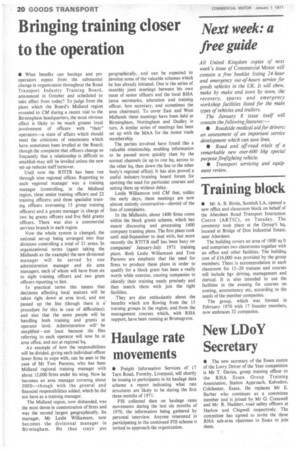Bringing training closer to the operation
Page 22

If you've noticed an error in this article please click here to report it so we can fix it.
• What benefits can haulage and psv operators expect from the substantial change in organization throughout the Road Transport Industry Training Board, announced in October and scheduled to take effect from today? To judge from the plans which the Board's Midland region revealed to CM during a recent visit to the Birmingham headquarters, the most obvious effect is likely to be much greater local involvement of officers with "their" operators—a state of affairs which should meet the criticisms of remoteness which have sometimes been levelled at the Board; though the complaint that officers change so frequently that a relationship is difficult to establish may still be levelled unless the new set-up reduces staff turnover.
Until now the RTITB has been run through nine regional offices. Reporting to each regional manager was a training manager (controlling, in the Midland region, three senior training officers and 22 training officers; and three specialist training officers overseeing 15 group training officers) and a grants manager in charge of two hq grants officers and five field grants officers. There was also a commercial services branch in each region.
Now the whole system is changed, the national set-up being arranged into four divisions controlling a total of 21 areas. In organizational terms (again taking the Midlands as the example) the new divisional manager will be served by one administration manager and six area managers, each of whom will have from six to eight training officers and two grant officers reporting to him.
In practical terms this means that decisions affecting local matters will be taken right down at area level, and not passed up the line (though there is i' procedure for this in case of difficulties); and also that the same people will be handling both training and grants at operator level. Administration will' be simplified—not least because the files referring to each operator will now be at area office, and not at regional hq.
An example of how the responsibilities will be divided, giving each individual officer fewer firms to cope with, can be seen in the case of Mr Tom Parsons, who has been Midland regional training manager with about 12,000 firms under his wing. Now he becomes an area manager covering about 3000—though with the general and financial responsibilities added, which he did not have as a training manager.
The Midland region, now disbanded, was the most dense in concentration of firms and was the second largest geographically. Its manager, Mr Leslie Williamson, now becomes the divisional manager in Birmingham. He thus stays put geographically, and can be expected to develop some of the valuable schemes which he has already initiated. One is the series of monthly joint meetings between his own team of senior officers and the local RHA (area secretaries, education and training officer, hon secretary, and sometimes the area chairman). To cover East and West Midlands these meetings have been held at Birmingham, Nottingham and Dudley in turn. A similar series of meetings has been set up with the MAA for the motor trade membership.
The parties involved have found this a valuable relationship, enabling information to be passed more quickly than by the normal channels (ie up to one hq, across to the other hq, then down the line to the other body's regional office). It has also proved a useful industry /training board forum for spotting,the need for particular courses and setting them up without delay.
Leslie Williamson told CM that, unlike the early days, these meetings are now almost entirely constructive—devoid of the lists of complaints.
In the Midlands, about 1400 firms come within the block grants scheme, which has meant discussing and processing 1400 company training plans. The first plans took until mid-September to deal with, but more recently the RTITB staff has been busy on companies' January-July 1971 training plans. Both Leslie Williamson and Tom Parsons are emphatic that the need for firms to produce these plans in order to qualify for a block grant has been a really worth while exercise, causing companies to identify their training needs precisely and then match them with just the right They are also enthusiastic about the benefits which are flowing from the 15 training groups in the region, and from the management courses which, with RHA support, have been running at Bromsgrove.




















































































